Impact
Equipment Funded in 2022 ($6,807,048)
Thank you to our donors and Thunder Bay 50/50 supporters for funding these vital pieces of equipment!
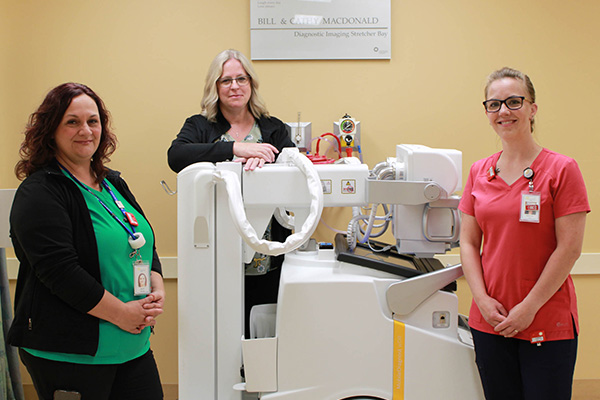
Portable X-Ray Unit Replacement
(Diagnostic Imaging, $254,725)
Equipment upgrade and replacement
The existing portable x-ray unit can no longer be used because one of its removable parts was recently decommissioned. This new digital portable X-ray unit is a sealed unit, which will reduce wear and tear of its parts and has newer technology offering improved image quality and lower radiation dose to the patient and staff.
OR X-Ray C-Arm Replacement
(Diagnostic Imaging, $331,143)
Equipment upgrade and replacement
C-arms are used by specialized physicians in the operating room for various surgeries as well as procedures in Endoscopy and Ambulatory Care. If a C-arm is out of service, patient procedures can be potentially delayed. This new C-arm will replace an ageing one and features state-of-the-art technology for improved image quality and lower doses of radiation for the patient.
Radio-frequency Ablation (RFA) Generator
(Diagnostic Imaging, $50,945)
Equipment to treat kidney tumours
During radio-frequency ablation (RFA), a thin needle-like probe is inserted into the kidney tumour. The unit generates a high-frequency electrical current, destroying cancer cells with intense, localized heat. Having this equipment in Diagnostic Imaging eliminates the need for patients to have the procedure done in an operating room, which would also potentially result in Hospital admission.
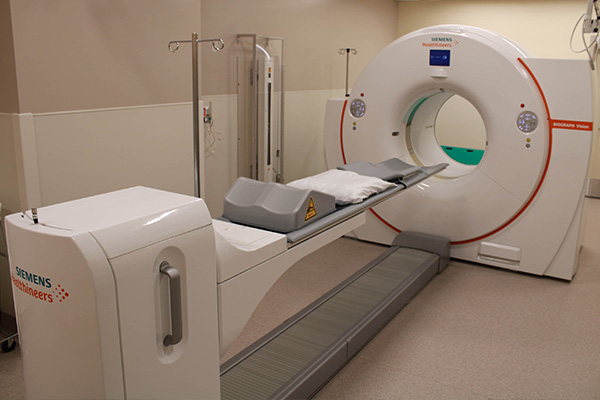
PET/CT Replacement
(Diagnostic Imaging, $500,000)
Reconstruction to accommodate new equipment
The PET/CT is a type of nuclear medicine that uses medical radioisotopes (generated in our cyclotron) to image cancer in the body. These scans help doctors diagnose cancer and develop radiation treatment plans for patients. Our current PET/CT scanner is 14 years old and needs to be replaced to avoid delays due to breakdown. Installing the new PET/CT scanner is part of a larger project as the plan includes installing the new scanner in a new room.
Capital Equipment
(Labour & Delivery Maternal Newborn, $120,000)
Equipment for infant care in Labour & Delivery
All of these pieces of equipment are vital and required for the standard, safe care of a newborn infant – and all of them are in need of replacing. This equipment includes two infant warmers, a delivery cart for instruments, a resuscitation panel (should an infant require breathing assistance at birth), stirrups, and a bili blanket to reduce jaundice in newborns.
Infant Cribs & Masino Oximeter
(Paediatrics Inpatient & Outpatient, $24,500)
Equipment for inpatient and outpatient infant care
Infant cribs are necessary for basic standard of care. Two new cribs will replace ageing cribs and are equipped with features such as teething rails, anti-microbial coating, head and knee elevation indicators, and shelving for oxygen tank holders. The oximeter monitors oxygen levels of our sickest paediatric patients.
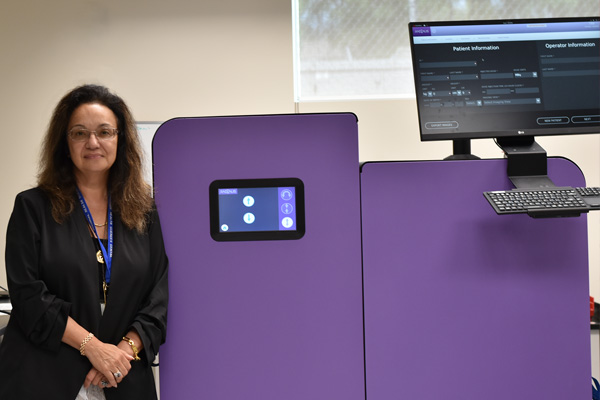
Radialis PET Camera
(Research Institute, $458,505)
Equipment for clinical trial investigating unit's effectiveness monitoring chemotherapy in breast cancer patients
The Radialis PET scanner, designed and developed in Thunder Bay, is now in clinical trials. The unit detects breast cancer tumours using molecular imaging, which is a more effective method of diagnosing breast cancer in women who have dense breast tissue. This new unit will initially be used in a study assessing whether or not it can be used effectively to monitor chemotherapy in breast cancer patients. Possible future clinical trials will assess the Radialis PET scanner in monitoring treatment of other cancers such as prostate, rectal, and lung.
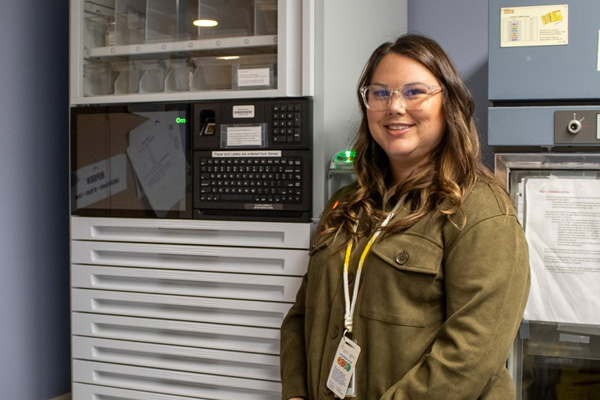
Automated Medication dispensing Units
(Pharmacy, $100,000)
Equipment to improve medication speed and safety
Automated dispensing cabinets are proven to improve medication speed and safety – including at our Hospital. Rather than travel to the pharmacy to manually fill prescriptions, they can be reviewed and approved electronically. Then, the secure cabinet automatically dispenses the right medication and dose to authorized healthcare professionals on that unit. This greatly increases speed and reduces the risk of medication errors, improving both patient safety and comfort. With this grant, outpatient units at the Hospital where medication administration is a predominant practice (Cancer Centre, Renal Unit, Surgical Day Care) will now have automated dispensing cabinets.
3T MRI Upgrade
(Research Institute, $67,756.85)
Equipment upgrade of current 3T MRI unit and reconstruction of the MRI Suite
The Thunder Bay Regional Health Research Institute is home to many groundbreaking research projects. Many of these need the most up-to-date MRI technology such as research into COVID-19 and brain diseases including Alzheimer's. This upgrade and necessary reconstruction of the MRI suite will extend the useful life of our 3T MRI. In turn, it will help retain our scientists; provide research opportunities for clinicians, students (NOSM, Lakehead University, Confederation College); and allow us to build stronger research partnerships with other research institutions and agencies.
Biochemistry & Microbiology Equipment
(Lab, $165,051)
Equipment to measure alcohol levels and identify infectious diseases
Two new gas chromatographers will replace ageing units. This equipment is essential for detecting dangerous alcohol levels in patients including identifying the type of alcohol, which is key for treatment planning. Annual volume in 2022 is 23,856 compared to 319 in 2006. The automated gram stainer will also replace an ageing unit, and is used to identify infectious pathogens for treatment planning.
Patient Wandering & Infant Abductions Systems
(Capital Planning, $612,000)
Equipment to track movements of at-risk patients
Some patients in units 1A, 2A, and 2B are at risk of wandering, which can lead to them getting lost or injured. Bracelets alert staff if these patients wander outside of their rooms. Similarly, infant bracelets help reduce the risk of abduction. When activated, doors in Maternal Newborn automatically close and lock to prevent unauthorized movement of an infant outside of designated areas.
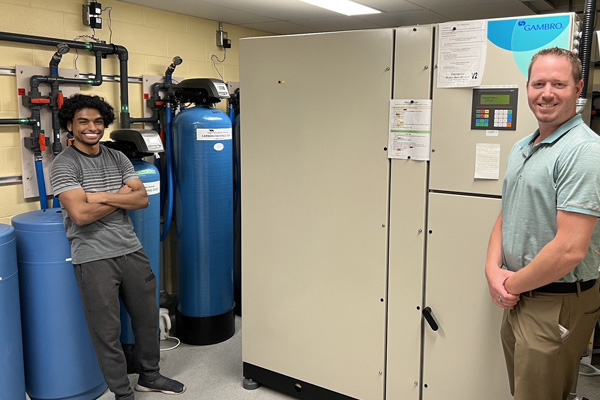
Central Water Purification System
(Renal Program, $600,298.94)
Equipment for purifying water used during hemodialysis
Water purification is essential for safe hemodialysis for our 200+ patients. Our current system is 18 years old (original to our Hospital) and requires replacing to ensure safe, continuous operation for our dialysis patients in Thunder Bay.
OR 8 (Urology) Integration and Video Upgrade
(Surgery, $308,686)
Equipment for minimally invasive urological surgery
Minimally invasive surgery (MIS) reduces surgery risks, improves outcomes, and reduces hospital stays. New generation systems are integrated, which means they are centrally controlled through one control panel, freeing up nursing staff and streamlining procedures. This new system is ceiling mounted, giving the equipment a better range of movement and freeing up floor space. Integration also improves remote learning opportunities for students and doctors learning new procedures.
Vein Viewer 3.0 Flex
(Ambulatory Care, $9,590.93)
Equipment to detect veins for IV access
Some people have veins that are harder to see, making accessing those veins for IVs more difficult. That can lead to more “pokes” of the needle and greater discomfort to the patient. This new vein finder will help nurses find the vein the first time for fewer pokes and less discomfort.
Ophthalmology Microscope
(Surgery, $229,222)
Equipment to replace and upgrade current eye surgery microscope
The ophthalmology microscope is used during cataract surgery (over 2,200 per year) and operations to repair traumatic eye injuries. This new unit replaces an ageing (15+ years) unit. It also represents an upgrade with features that allow up to 16 surgeries per day as well as an external monitor for the team to follow along more closely and for teaching purposes.
Cardiac Monitors (2)
(Endoscopy, $24,453)
Equipment to monitor vital signs during clinical procedures
During clinical procedures, it is important that a patient's heart rate, rhythms, oxygen levels and blood pressure be monitored, especially when medications are used to relax patients. This close monitoring helps avoid complications for patients or admission to hospital. These two new cardiac monitors are essential as they will be replacing ageing monitors that are getting more difficult to repair.
Ventilators (2)
(Respiratory Therapy, $102,872.18)
Equipment to help patients breathe
Patients may have difficulty breathing for a number of reasons including coma, lung injury, COVID-19, asthma, and low blood pressure, among many others. These two ventilators will replace ageing units to ensure a full complement of ventilators for our patients from babies to adults.
Pulmonary Function Testing Lab
(Respiratory Therapy, $203,790)
Equipment to test breathing ability
Pulmonary function testing (PFT) involves a series of non-invasive breathing tests to measure flow, lung volume, and gas exchange. It is used to help diagnose certain breathing issues including asthma, and helps doctors monitor patients with chronic pulmonary diseases. This lab replaces an ageing lab from the Port Arthur General Hospital first installed 20+ years ago.
Door Card Swipe
(Emergency Department, $5,970)
Equipment to secure certain doors in the Emergency Department
Each day, the Emergency Department sees 15 patients on average presenting with mental health and/or addictions issues. Door card swipes will enable the Emergency Department to create a safe space for those at greatest risk and restrict access to these areas for better patient safety.
ECG Machine
(Cardiac Diagnostics, $22,940)
Equipment to evaluate heart function
An electrocardiogram (ECG) is the go-to for quick evaluation of the heart to help diagnose issues related to heart function and electrical activity. These include inflammation or enlargement of the heart, damage to the heart muscle, and blockages. “Time is muscle”, so fast, accurate diagnosis is essential. This new ECG machine replaces an ageing unit prone to breakdown to ensure availability for heart patients.

Cardiac Catheterization Lab Replacement
(Cardiac Cath Lab, $2,037,800)
Equipment for angioplasty and other heart catheterization procedures
Cath labs, which consist of a C-arm, patient table, and control station, typically last 10 years in regular use. We use both cath labs five days per week for scheduled procedures, though they are open 24/7 for emergency procedures including angioplasties. One of these labs is now past end of life and needs replacing. This replacement will also be an upgrade offering the latest technology including integrated systems for more streamlined procedures.
Cancer Program Capital Equipment
(Regional Cancer Care, $263,487)
Equipment for safer, more effective radiation treatment
Our two linear accelerators (linacs) provide radiation treatment for cancer patients. These adaptable units can be upgraded to extend their functional lifetime. This grant will purchase a number of upgrades including new IT hardware, a breath-hold system, an MR image distortion correction system, and a server upgrade. All will help our Cancer Centre provide safer, more effective radiation treatments to our cancer patients.
NAPRA Project
(Cancer Centre Pharmacy, $200,000)
Equipment for safer preparation of chemotherapy compounds
All cancer programs in Ontario must follow National Association of Pharmacy Regulatory Authorities (NAPRA) guidelines for preparing chemotherapy compounds. However, due to evolving guidelines, our facility was no longer compliant. This grant provides for better ventilation, designated preparation areas to decrease risk of cross-contamination, and better room design. Ultimately, these changes will result in safer preparation of chemotherapy compounds for patients and staff.
Equipment funded in regional hospitals
Pentax Colonoscope, Terrace Bay
(Regional Cancer Care, $32,885.06)
Equipment to replace ageing colonoscopy equipment
The North of Superior Healthcare Group in Terrace Bay strives to provide closer-to-home colonoscopy and endoscopy services so that patients do not have to travel to Thunder Bay or elsewhere for care. This new colonoscope supports that mission, replacing and upgrading ageing equipment.
Novum IQ Pumps (3), Fort Frances
(Regional Cancer Care, $16,038)
Equipment replacement and upgrade for chemotherapy infusion
Regional Cancer Care supports several outpatient chemotherapy programs throughout Northwestern Ontario for closer-to-home care. The program at Riverside Health Care in Fort Frances needs to replace ageing chemotherapy IV infusion pumps. These new single-channel pumps are an upgrade in technology, which will improve patient safety.
Ultrasound Machine, Fort Frances
(Regional Cancer Care, $24,510.88)
Equipment to support a local PICC line program
Many patients undergoing chemotherapy have a peripherally inserted central catheter (PICC) line for chemotherapy infusion. Ultrasound helps guide the insertion procedure. Previously, patients had to travel to Thunder Bay to get their PICC line inserted. This new and upgraded ultrasound equipment ensures that the cancer program in Fort Frances can continue to perform closer-to-home PICC line insertions, which to date has eliminated that travel for 275 patients.
Chemotherapy Infusion Room Renovation, Red Lake
(Regional Cancer Care, $3,064.56)
Renovations to improve observation during chemotherapy
Currently the chemotherapy infusion room at the Red Lake Margaret Cochenour Memorial Hospital is separate from the oncology office. This means that patients may be out of sight of staff during certain points of their long treatments. These renovations, including a new observation window, will improve patient safety, allowing staff to continuously observe patients in the rare occurrence of a reaction to the medications.
MOPEC Camera HR and Software, Sioux Lookout
(Regional Cancer Care, $36,814.45)
Equipment to enhance communications during tumour biopsies
Biopsies of tumours are important prior to surgery to determine whether or not the tumour is cancerous. The surgical team Sioux Lookout Meno Ya Win Health Centre prepares the slides with biopsy slices under the guidance of pathologists in Kenora before sending those slides to their lab. Currently, the team uses FaceTime on an iPad, which is not an effective method. This new camera equipment will improve efficiency and provide high-quality video and images.